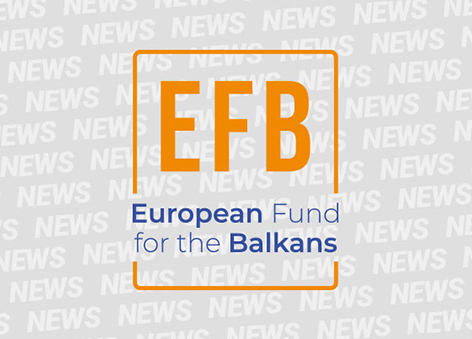
 There was a packed house at the EFB’s “Back to the Future” event on June 2nd, held as part of the Brussels EFC Foundations Week. Young and talented Balkan residents, some of whom had benefited from the EFB’s largesse, were brought together to present their views on the region’s past, present and future.
There was a packed house at the EFB’s “Back to the Future” event on June 2nd, held as part of the Brussels EFC Foundations Week. Young and talented Balkan residents, some of whom had benefited from the EFB’s largesse, were brought together to present their views on the region’s past, present and future.
Introducing the event, EFB Executive Director Hedvig Morvai-Horvat focused on the Fund’s wish to invest in young people of the Western Balkan region and gave some details of the impressive number of initiatives and events organised by the EFB since its creation in 2007. A short documentary film – “The Culture Lobby” – described the hopes and fears of the region’s people and perfectly set the scene for the discussion.
Gallup researcher Andrzej Pyrka had the job of moderating the debate and managed to skilfully use the lyrics of the Balkan Eurovision Song Contest entries to illustrate feelings on the ground. Kicking off the discussion, Andrzej asked the speakers to give a personal perspective.
Tirana’s Enkeleda Suti admitted she was apprehensive about Albania losing part of its culture and solid family foundations if it joined the EU. Skopje’s Mila Stankovik was rather scared of the economic pressure on Macedonia once it entered the Union but was generally looking forward to a European future.
Sarajevo’s Vedran Mujagić – whose music was featured at the debate – surprised the audience by stating that the Dayton Agreement had made four million people miserable; it had, however, provided him with a significant amount of creative input. From Serbia, Belgrade’s Milica Pekić bemoaned the lack of state support for culture and Predrag Nikolić wanted to reduce the centralised focus on Belgrade as Serbia was much more than that.
After illustrating opinions with some data from the Gallup Balkan Monitor and other surveys, Andrzej asked the speakers to look forward to 2025. Vedran wanted his people to stop passively waiting for the EU and to be proactive; Bosnia had to become self-sustainable and a normal member of the EU community. Milica wanted the potential of the region’s young people to be recognised and, for herself, she wished to be totally free.
The last word went to Mila, who did not want to say what she would be doing in 2025 as, above all, she liked surprises. The event had certainly been a breath of fresh air and as, for once, the sun shone in Brussels, the audience left with a better understanding of the talent, strength and intelligence of the region’s young people. And that was exactly what the EFB had wanted.
Taken from Gallup Balkan Monitor






